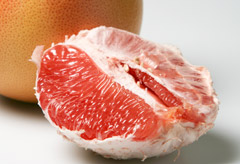Grapefruit ingredient could be used in diet pill
The compound gives grapefruit its bitter taste could prevent obesity

The compound gives grapefruit its bitter taste could prevent obesity
The chemical compound which gives grapfefruit its bitter taste could be used to create a diet pill, a study has indicated. Research found naringenin, which is described as a flavonoid found in citrus fruit, has a revolutionary effect on the liver making it burn fat instead of storing it after a meal. This means that without having to change diets or cut out particular foods, a dose of naringenin could prevent weight gain and even help to lose it.
Long-term, the researchers behind the tests believe it would also help obesity sufferers and even fight diabetes because the process also helped balance insulin and glucose levels.
Grapefruit has long been recommended as a good way to control weight but the tests involved far higher doses of naringenin than would be accessible just by eating grapefruit. It would have to be concentrated into a supplement to have the desired effect for those suffering from Type 2 diabetes, which is also a precursor to cardiovascular disease.
The tests were carried out on mice by a team at the Robarts Research Institute at the University of Western Ontario and published in the journal Diabetes.
Two groups of mice were both fed the equivalent of a Western diet to speed up their ‘metabolic syndrome’ – the process which leads to Type 2 diabetes in humans. The food given to one of the groups was treated with naringenin.
The non-naringenin mice became obese, they developed the metabolic syndrome which saw their cholesterol rise and their bodies become resistant to insulin. The mice given naringenin did not suffer from these. Any rise in cholesterol was corrected by the naringenin which also 'reprogrammed' the live to burn up fat rather than store it.
Lead researcher Professor Murray Huff added: ‘What was unique about the study was that the effects were independent of caloric intake, meaning the mice ate exactly the same amount of food and the same amount of fat.
‘There was no suppression of appetite or decreased food intake, which are often the basis of strategies to reduce weight gain and its metabolic consequences.’
The researchers will now try and develop the compound into a drug which would be both effective and safe for humans to take as a supplement or treatment. CLICK HERE FOR MORE HEALTH NEWS
ARE YOU A TWITTERER? FOLLOW US HERE!
BECOME A MARIE CLAIRE FACEBOOK FAN HERE

The leading destination for fashion, beauty, shopping and finger-on-the-pulse views on the latest issues. Marie Claire's travel content helps you delight in discovering new destinations around the globe, offering a unique – and sometimes unchartered – travel experience. From new hotel openings to the destinations tipped to take over our travel calendars, this iconic name has it covered.